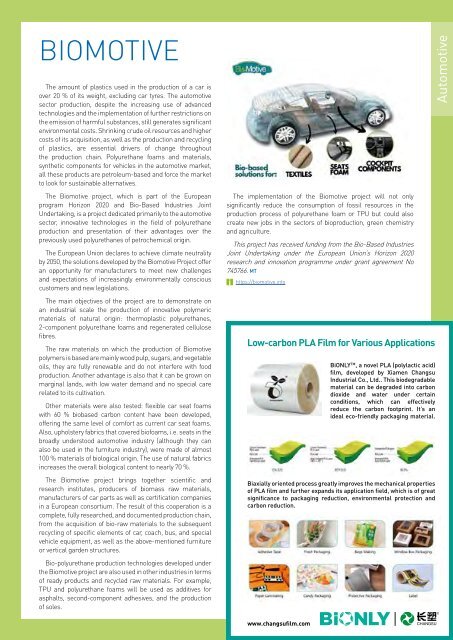issue 01/2022
Highlights: Automotive Foam Basics: Biodegradation
Highlights:
Automotive
Foam
Basics: Biodegradation
Create successful ePaper yourself
Turn your PDF publications into a flip-book with our unique Google optimized e-Paper software.
BIOMOTIVE<br />
The amount of plastics used in the production of a car is<br />
over 20 % of its weight, excluding car tyres. The automotive<br />
sector production, despite the increasing use of advanced<br />
technologies and the implementation of further restrictions on<br />
the emission of harmful substances, still generates significant<br />
environmental costs. Shrinking crude oil resources and higher<br />
costs of its acquisition, as well as the production and recycling<br />
of plastics, are essential drivers of change throughout<br />
the production chain. Polyurethane foams and materials,<br />
synthetic components for vehicles in the automotive market,<br />
all these products are petroleum-based and force the market<br />
to look for sustainable alternatives.<br />
The Biomotive project, which is part of the European<br />
program Horizon 2020 and Bio-Based Industries Joint<br />
Undertaking, is a project dedicated primarily to the automotive<br />
sector, innovative technologies in the field of polyurethane<br />
production and presentation of their advantages over the<br />
previously used polyurethanes of petrochemical origin.<br />
The European Union declares to achieve climate neutrality<br />
by 2050, the solutions developed by the Biomotive Project offer<br />
an opportunity for manufacturers to meet new challenges<br />
and expectations of increasingly environmentally conscious<br />
customers and new legislations.<br />
The main objectives of the project are to demonstrate on<br />
an industrial scale the production of innovative polymeric<br />
materials of natural origin: thermoplastic polyurethanes,<br />
2-component polyurethane foams and regenerated cellulose<br />
fibres.<br />
The raw materials on which the production of Biomotive<br />
polymers is based are mainly wood pulp, sugars, and vegetable<br />
oils, they are fully renewable and do not interfere with food<br />
production. Another advantage is also that it can be grown on<br />
marginal lands, with low water demand and no special care<br />
related to its cultivation.<br />
Other materials were also tested: flexible car seat foams<br />
with 60 % biobased carbon content have been developed,<br />
offering the same level of comfort as current car seat foams.<br />
Also, upholstery fabrics that covered biofoams, i.e. seats in the<br />
broadly understood automotive industry (although they can<br />
also be used in the furniture industry), were made of almost<br />
100 % materials of biological origin. The use of natural fabrics<br />
increases the overall biological content to nearly 70 %.<br />
The Biomotive project brings together scientific and<br />
research institutes, producers of biomass raw materials,<br />
manufacturers of car parts as well as certification companies<br />
in a European consortium. The result of this cooperation is a<br />
complete, fully researched, and documented production chain,<br />
from the acquisition of bio-raw materials to the subsequent<br />
recycling of specific elements of car, coach, bus, and special<br />
vehicle equipment, as well as the above-mentioned furniture<br />
or vertical garden structures.<br />
Bio-polyurethane production technologies developed under<br />
the Biomotive project are also used in other industries in terms<br />
of ready products and recycled raw materials. For example,<br />
TPU and polyurethane foams will be used as additives for<br />
asphalts, second-component adhesives, and the production<br />
of soles.<br />
The implementation of the Biomotive project will not only<br />
significantly reduce the consumption of fossil resources in the<br />
production process of polyurethane foam or TPU but could also<br />
create new jobs in the sectors of bioproduction, green chemistry<br />
and agriculture.<br />
This project has received funding from the Bio-Based Industries<br />
Joint Undertaking under the European Union’s Horizon 2020<br />
research and innovation programme under grant agreement No<br />
745766. MT<br />
https://biomotive.info<br />
Low-carbon PLA Film for Various Applications<br />
BiONLY TM , a novel PLA (polylactic acid)<br />
film, developed by Xiamen Changsu<br />
Industrial Co., Ltd.. This biodegradable<br />
material can be degraded into carbon<br />
dioxide and water under certain<br />
conditions, which can effectively<br />
reduce the carbon footprint. It’s an<br />
ideal eco-friendly packaging material.<br />
Biaxially oriented process greatly improves the mechanical properties<br />
of PLA film and further expands its application field, which is of great<br />
significance to packaging reduction, environmental protection and<br />
carbon reduction.<br />
Automotive<br />
www.changsufilm.com<br />
bioplastics MAGAZINE [<strong>01</strong>/22] Vol. 17 23

















